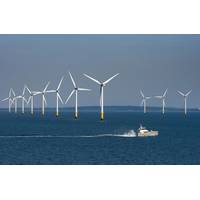Three NOAA scientists honored by White House
The White House yesterday awarded three NOAA scientists with Presidential Early Career Awards for Scientists and Engineers. The award is the highest honor given by the federal government to outstanding scientists and engineers in the early stages of their careers.
The honorees are Alan Haynie, Ph.D., of NOAA’s Fisheries Service, Alaska Fisheries Science Center; Scott Weaver, Ph.D., of NOAA’s National Weather Service’s Climate Prediction Center, and Adam Clark, Ph.D., of the Cooperative Institute for Mesoscale Meteorological Studies, who works at NOAA Research’s National Severe Storms
Laboratory. The NOAA scientists are part of a group of 102 scientists from across federal agencies that received the prestigious award.
“NOAA is home to some of the world’s leading scientific research and our scientists strive each day to tackle some of the biggest challenges facing our planet,” said NOAA Administrator Kathryn Sullivan, Ph.D. “Through their research on improving sustainable fisheries management, predicting future changes to our planet’s climate, and improving severe weather forecasts, these young scientists are turning science into environmental intelligence that is used to make decisions that benefit our planet. We’re proud of their work, and I applaud them for this highly prestigious recognition.”
Alan Haynie, Ph.D., is a leader in creating and using economic tools to improve the management of our nation’s marine resources. He has developed innovative models that help explain and predict fisher behavior amid changing environment, market conditions and management systems. Haynie has also worked with diverse stakeholders to create and implement new programs to reduce unintended catch of salmon, called bycatch, in the Bering Sea pollock fishery. Haynie has organized numerous workshops with scientists and stakeholders, and has served as a mentor to many students and other researchers. He received his Ph.D. in economics from the University of Washington, where he was a NOAA Fisheries/Sea Grant Marine Resource Economics Fellow. He earned his undergraduate degree from Stanford University.
Scott Weaver, Ph.D., of NOAA’s National Weather Service’s Climate Prediction Center PECASE honoree — Scott Weaver, Ph.D., of NOAA’s National Weather Service’s Climate Prediction Center. Scott Weaver, Ph.D., is recognized for innovative research toward the development of a seasonal outlook for tornadoes and for his leadership and outreach to develop NOAA's Climate Prediction Center as a center of excellence, supporting the nation with climate prediction and monitoring services.
He is leading scientific research activities with federal and academic partners to accelerate research advances into operations, most visibly by working to develop a seasonal severe weather outlook. He has helped advance the frontiers of scientific knowledge by conducting research to understand why the central U.S. has experienced a cooling trend in the midst of continental and global warming, and in linking climate phenomena to United States seasonal tornado activity. Weaver is passionate about promoting climate science literacy and mentors undergraduate and graduate students through NOAA’s Student Career Experience Program. He earned a bachelor of science degree in
meteorology from Rutgers University, a master of science degree in atmospheric science and a Ph.D. in atmospheric and ocean science from the University of Maryland.
Adam Clark, Ph.D., of the Cooperative Institute for Mesoscale Meteorological Studies, who works at NOAA Research’s National Severe Storms Laboratory. PECASE honoree —
at NOAA Research’s National Severe Storms Laboratory. Adam Clark, Ph.D., is recognized as a pioneer in the development of the next generation of weather models that will predict individual thunderstorms over large parts of the globe. Clark and his team are finding innovative ways to extract useful information from these detailed models, including a method that helps forecasters better predict the severity of tornado outbreaks. Clark also studies the quality of the weather models, and looks for ways to make them more accurate. His work is part of the NOAA Office of Oceanic and Atmospheric Research project to increase tornado, severe thunderstorm and flash flood warning lead-times, ultimately saving lives and protecting property. These significant contributions help NOAA work toward its goal of creating a Weather Ready Nation. Clark is also being honored for his role as a mentor for students working in the field of research meteorology. He earned his doctorate, master’s and bachelor of science degrees in meteorology from Iowa State University.
NOAA’s mission is to understand and predict changes in the Earth's environment, from the depths of the ocean to the surface of the sun, and to conserve and manage our coastal and marine resources.










